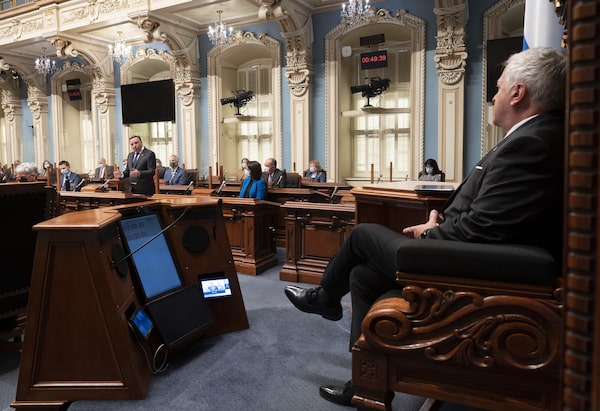
Quebec Premier François Legault, left, delivers the inaugural speech, Oct. 19. 2021, at the legislature in Quebec City. Speaker Francois Paradis, right, looks on.Jacques Boissinot/The Canadian Press
Just before stepping down last year, Quebec MNA Claire Samson compared the life of a backbench member of the National Assembly such as herself to that of a potted plant.
“Of all the jobs I’ve had, including when I was 17 and worked as a clerk at Miracle Mart and when I was a waitress at Da Giovanni, [being an MNA] has been the job where I’ve worked the least in my life,” she said in announcing she would not run in the 2022 election.
First elected under the Coalition Avenir Québec banner in 2014, the straight-talking Ms. Samson emerged as a maverick member of the CAQ caucus after the party won power in 2018 and she was passed over for a cabinet job by Premier François Legault. In 2021, she crossed the floor to sit as the sole Quebec Conservative Party member of the legislature until last October’s election.
Gone, but not forgotten, Ms. Samson’s rumination on the underemployed life of a backbencher has been on the minds of many Quebeckers this month after Mr. Legault’s government tabled legislation to give MNAs a 30-per-cent pay increase. Bill 24 would make Quebec MNAs the highest-paid provincial legislators in Canada, with a base salary of $131,766, up from $101,561.
Members of the Alberta legislature earn a base salary of $120,936, down from $134,000 in 2014. Provincial legislators in Ontario have had their base salaries frozen at $116,500 since 2009, even though the average Ontario MPP represents far more constituents than his or her Quebec counterpart. The average Ontario riding has 86,778 voters compared to 50,409 in Quebec.
Federal MPs earn a base salary of $194,600, with an average of 81,339 voters per riding.
Unlike their counterparts in other provinces, Quebec MNAs also receive a pre-federal-tax expense allowance of $38,184. As a result, Bill 24′s adoption would increase an MNA’s remuneration to almost $170,000. Tack on a 20-per-cent supplement for committee work, and the average backbench Quebec MNA salary would reach almost $200,000 once Bill 24 passes.
The three-person committee composed of two ex-MNAs and a compensation expert that recommended the increases argued in a report last month that Quebec MNAs have more responsibilities relative to their counterparts in other provinces, and so should earn more.
“Considering that Quebec has chosen to fully exercise certain constitutional powers, Quebec parliamentarians are required to deal with more matters (police services, housing, daycare services, etc.) than in other provinces,” the report of the Comité consultatif indépendant sur la révision de l’indemnité annuelle des membres de l’Assemblée nationale said.
“Thus, to well represent the interests of their citizens, Quebec parliamentarians must be able to master not only exclusive provincial matters, but must also stay abreast of measures adopted by the Parliament of Canada in areas of shared jurisdiction that affect Quebeckers. Added to that is the linguistic particularity of Quebec, which requires [MNAs] to ensure French is preserved.”
Economic migrants to Quebec must speak and write French, premier Legault says
Still, a 30-per-cent raise, when the Legault government is offering only a 9-per-cent salary increase over five years to provincial public sector employees? After all, it is not like MNAs have faced a salary freeze in recent years. Their base salary has increased by 15 per cent since 2013.
Mr. Legault, a former businessman who made a small fortune before entering provincial politics in 1998, has insisted that it took “courage” on his government’s part to table Bill 24. But the raise is needed to attract more people to politics, “not just those who made money before.”
Still, a 30-per-cent increase all at once does seem exorbitant. A poll commissioned by the opposition Québec Solidaire found that almost three-quarters of respondents opposed the increase. QS plans to vote against Bill 24, as does the Parti Québécois. But with a combined 14 of 125 seats in the National Assembly, QS and the PQ are resigned to Bill 24 becoming law.
Several QS MNAs have indicated they will donate their additional salary to unspecified charities. The PQ’s three MNAs will keep only an amount equal to what public-sector workers gain in current contract negotiations, and will donate the rest to charity.
Ms. Samson was unkind in comparing a backbencher to a potted plant, as if neither works very hard. Photosynthesis is hard work. Most backbenchers also work very hard. A 2019 survey of 55 MNAs found they work an average of 63 hours a week and spend 10 hours travelling. Most are separated from their families for long periods of time when the legislature is in session.
But a 30-per-cent increase for MNAs is too much for most Quebeckers to stomach. Mr. Legault should reduce the size of the raise and spread its implementation over several years. Otherwise, he risks making Quebeckers more resentful of their politicians.
 Konrad Yakabuski
Konrad Yakabuski